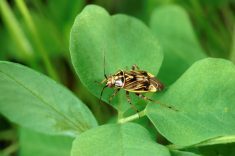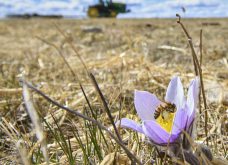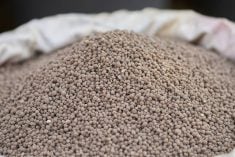Researchers in Alberta are exploring whether naturally occurring, insect-killing nematodes could help Prairie farmers battle some of canola’s most persistent insect pests.
The results from that research, led by Olds College research scientist Shabeg Briar, have been promising.
WHY IT MATTERS: Farmers more often think of nematodes as dangerous crop pests, such as soybean cyst nematode, but not all nematode species are farm enemies. Research out of Alberta is looking at nematodes that target canola pest insects.
Read Also

Market impacts of canola headlines need digesting
January 2026 has been quite the month for Canadian canola trade, how will it all ripple out in the market?
Nematodes are tiny roundworms that live in the soil and infect insects. Several species have shown high levels of pest control in lab tests.
While they’re often seen as a crop pest, interest in using nematodes to control insect pests isn’t new. In the 1980s, Cornell University researcher Elson Shields began testing beneficial nematodes as a long-term control for alfalfa snout beetle, work that would eventually help establish him as a pioneer in the field.
But alfalfa snout beetle was a very localized problem, confined to a handful of counties in New York and Ontario. That limited the commercial appeal for widespread agricultural use and, for the most part, nematodes have remained niche tools, used mostly in greenhouses and by home gardeners.
“They are currently not available in the Canadian Prairies for larger-scale use on field crops,” Manitoba Agriculture entomologist John Gavloski says. Production and marketing could scale up, he adds, if nematodes proved effective against major field crop pests.

Research done in Ontario looking at using beneficial nematodes to treat corn rootworm had promising results, he says. With continued positive results from these kinds of studies, the technology could soon become a familiar tool in Prairie farmers’ integrated pest management toolbox.
Encouraging results from Alberta
The Alberta study tested four types of commercially available entomopathogenic nematodes (EPNs) at various concentrations to see which were most effective.
The nematodes stacked up well. Diamondback moth larvae showed up to 90 per cent mortality; lygus bugs, up to 87 per cent; and black cutworms were almost entirely wiped out. Cabbage root maggots were also effectively controlled, reaching 83 per cent mortality, but the pupae proved more difficult to kill. Unfortunately for canola growers, their No. 1 pest, the flea beetle, appeared largely unaffected, with only 10 per cent mortality.
Still, the overall results are encouraging. With insecticide resistance on the rise and fewer chemical options available, biological tools such as EPNs could offer Prairie growers an environmentally friendly way to target insects hiding below the surface. While this would clearly be beneficial for organic growers, Gavloski suggested it would appeal to conventional farmers as well.
From lab to farm
While EPNs have yet to become available to farmers on the Canadian Prairies, the technology is already being put to use in the United States, thanks in part to the same researcher who helped pioneer it.
Elson Shields and his son Keegan have launched a company, Persistent BioControl, that’s beginning to open commercial markets for beneficial nematodes in the U.S., starting with corn and alfalfa farmers in the northeast.
The Iowa-based company grew out of Elson Shields’ decades of research, which demonstrated nematodes could provide long-term, soil-dwelling control of certain insect pests. But translating that academic success into a field-ready product wasn’t easy.
When he was thinking about retiring, Keegan Shields told his father if he didn’t want to see the technology sit on the shelf and go to waste, they ought to create a commercial source so farmers could buy it.
“The next step was to take it out of the lab and create a viable commercial enterprise,” Keegan Shields says.

Persistent BioControl was launched in 2019. When Elson retired from Cornell in 2022, he shifted his focus from research to business, taking on the role of chief technology officer for the company. Keegan is CEO.
Unlike most nematode products on the market, typically used as short-lived biopesticides in greenhouses or gardens, the nematodes sold by Persistent BioControl are designed to remain in the soil for a decade or longer after a single application. That has made the product especially appealing to row crop and forage producers.
“Our angle, and what makes this work for corn and other row crops, is the fact you can apply this one time and it’s going to give you the benefit for at least a few decades,” Shields says.
So far, more than 100,000 acres across the U.S. have been treated using this approach, most of them in New York. The company also works with organic vegetable growers targeting wireworm in root crops such as sweet potatoes, radishes and turnips, where nematodes are applied ahead of crop rotation to prevent feeding damage.
Application doesn’t require any specialty equipment. The nematodes are either injected into centre pivot irrigation systems or applied through conventional ground sprayers. For spray rigs, the tank and lines must be flushed, and all screens and filters removed.
Long-term value
The company uses a mix of three nematode species, adjusting the blend and application rate based on region, crop and pest pressure. For corn rootworm, the full cost is around US$70 per acre — higher than the $30 to $40 typically spent on soil insecticides. But for many farmers, the long-term value is clear.
“I thought I was going to have to spend a lot of time explaining the multi-year payback,” Shields says. “But they all get it immediately. You can see them start doing the math in their head: If I can eliminate my soil insecticide, this is a two-year payback, and if it works for the next decade, I’m a whole lot of money ahead.”

While Persistent BioControl hasn’t yet entered the Canadian market at scale, Shields says they’ve begun working with organic growers in Ontario, first by overnight shipping small orders and more recently by setting up a broker-assisted process that allows customers to legally bring product across the border themselves. Since the nematodes are naturally occurring and non-invasive, they don’t raise regulatory red flags.
Scaling up
“This will be year six for us,” Shields said. “We’ve got a lot of demand, and now we’ve got the ability to produce for 100,000 acres a year. We’re just going through the struggles of scaling up — hiring people, building out the facility, et cetera.”
Shields wasn’t familiar with Briar’s research in Alberta but says he’s keen to see nematodes explored in crops such as canola. “I would imagine any kind of treatment in canola is going to be similar to corn.”
















